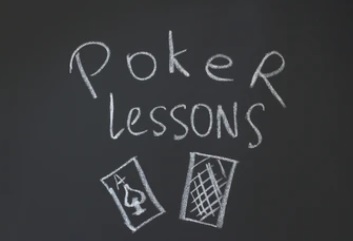
Contents
In this article I am going to try and give some advice to beginning online poker players, advice I wish I would have received before I started playing. Hopefully, those players who have been playing for at least 6 months will agree, on the whole, with the advice I am about to give.
Accept that you are not a very good player to begin with.
This is very difficult for anyone to accept. We are told that poker is a game of skill and that if you are more skilful than your opponents then you will win money off them (in the long run). However, poker is unlike other sports in that for some reason people seem to consider that they are the most skilful player in the World within 2 minutes of playing; usually from around the time they win their first pot.
You would not find this mentality from somebody beginning another game like chess or golf. That is because people accept that experience is a crucial ingredient in becoming successful. (It is also because those are games which are not linked directly with money). Experience is a massive factor in poker, and there is no substitute for hours logged at the tables.
When I first started playing I thought I was the greatest from day 1. This mentality got me into early difficulties because I promoted myself up the limits far too quickly and then suffered the inevitable repeated blow outs as a result.
The truth was that I was terrible. In fact, I was probably worse than the vast majority of beginners because I had no base knowledge apart from what I had watched on TV. So my advice is to just accept that you are not very good, even if you find that you are 50 big bets up after the first 2 hours. Keep telling yourself you are just getting lucky. This will stop your ego from promoting you up to limits you have no business playing.
Be extremely wary of self analysis of your own ability.
This is linked to the above point, until you have many hours clocked up at the tables do not trust your assessment of your own ability. When I first started playing, I would win a bit and think I was the greatest player in the World. I would then go on a losing run, get depressed at how useless I was before the eventual upswing would occur and I would again think “I realise what I was doing wrong before, I now truly understand the game”. This cycle occurred countless times. I am telling you not to fall into this trap. Do not trust yourself to accurately assess your own ability.
So if you accept that you cannot trust your own assessment, what steps should you take? You should post at Forums and read as many hand examples as you can get your hands on. If you are fortunate enough to know someone who has a proven track record ask them to watch you play and discuss hands as they are in progress.
Distance yourself from your bankroll.
It is extremely difficult, even for seasoned players, not to equate success of failure with fluctuations in bankroll. Using your bankroll movements, at least in the short to medium term, as an indication of your ability is a big mistake. The truth is that in some of the best sessions I have ever played I have lost money and I have scored some big wins when I have made some atrocious decisions.
The problem with using your bankroll as an indicator is the mental swings you will suffer as a result. The highs are not good for you and the lows can be as depressing as anything you will encounter. As a beginner, I would recommend that you use other indicators in terms of monitoring your progress. A very good one is to actively watch hands you are not involved in and try to narrow down the range of hands you believe the players have given their actions. How accurate do you get? You should find that over time you develop more of a “feel” for the game.
Make sure you gain worthwhile experience.
Just playing hour after hour at the tables does not necessarily equate to worthwhile experience. When you are starting out you need to concentrate fully on what is going on around you to improve as a player. That means not emailing, watching TV or talking on the phone whilst you are playing online poker.
I also recommend playing full tables for at least the first couple of months. You need to obtain the necessary skills before you play shorthanded. I know you think full games are boring but you will make fewer mistakes and the action is slower so you can take in more. Also, it is more difficult to learn the basics from shorthanded play because it is a lot harder to narrow down an opponent’s range of hands.
It also brings us to the difficult subject of multitabling. I would highly recommend that beginners do not even think about multitabling for again, a few months. I was fortunate in that when I first started playing software limitations meant that I had no choice but to play one full table. If I made a mistake I had to sit there and mull over it because it might be 30 minutes before I got another playable hand. It may sound extremely boring but it was a good way of training yourself not to make the same mistake again.
These days, I see so many new players who within a couple of weeks are sitting at several 6max tables. This is not good experience. You can log as many hands as you want but if you do not learn from your mistakes because another table has popped up then you are stunting your improvement as a player.
The argument I usually receive when I make this point is to do with bonus chasing and the value it provides to low limit players. I accept that bonus chasing can provide extra profitability but it is this word “chase” that is often misconstrued. Just because you are in the middle of a “bonus chase” does not mean you have to get the necessary hands played in the quickest possible time. What is the point of building your bankroll up to a level where you can play 3/6 if you have not given yourself the education required to survive at that level?
See poker as a non-profitable activity for the first 6 months.
This is probably the most difficult piece of advice for beginners to accept. What is the point of playing the game if you cannot spend your winnings? Believe me; you are better off just leaving your bankroll where it is and just concentrating on improving as a player.
The problems with cashing out in the beginning are:
a) you only end up rebuying two weeks down the line for the amount you cashed out previously; and/or
b) you end up stagnating at a lower limit that your ability deserves because your bankroll is not sufficient enough to play higher.
I was guilty of making the mistakes 1 to 3. There is no doubt that I would have made mistake 4 if the software limitations had not been in place. I was very fortunate that I did not make mistake 5 and it is probably the reason why I am playing the limits I am today. 6 months after starting playing I had over 10,000$ in my account and was comfortable playing 10/20$. I did not actually cash out at all until my bankroll hit 20,000$. If I had taken 500$ out every time I hit 1000$ I may still be playing 2/4 or lower today.
I hope the above information is useful to any beginners reading this and if you have any questions, please do not hesitate to post them at my Ask Pilchard Forum. Until then, remember that there is a reason that people go through higher education, it is because they see it as a long term investment. Poker is no different. If you obtain a good education in the game, the proceeds will follow in due course.
Leave a Review
Submit your review | |



